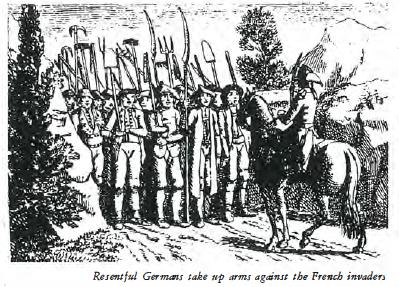During the late 1600’s Germany was ruled by many princes who were more concerned with their extravagance than the general welfare of their people. The large revenues they drew from the states left the states exhausted and impoverished. There was no regard for morality or decency when it came to their lavish lifestyles.
The turn of the century brought invasions by France and a continuing rivalry between the German states of Prussia and Austria. War became a national activity and a conscript army or draft was enforced. As Napoleon claimed more of Germany, Austria seemed to carry the war with no help from Prussia. It was not until Napoleon marched through Prussian borders that war was declared on France. In October of 1806, the Prussian army perished in one blow during the Battle of Jena. Napoleon then proceeded to conquer Westphalia and issue a continental system which forbade trade with England and threatened German commerce with ruin. Austria ceased to have any control over Germany once a treaty of peace was dictated in Vienna.
In the early 1800’s despite the humiliation of war many changes were taking place within Germany. Prussia had abolished serfdom and permitted the public to run for civil offices. Although Napoleon put limits on army size, the states continued to train large numbers of men by using a rapid number turnover. When Napoleon was defeated in Russia in 1812, Germany started a campaign and invaded France with a vengeance.
The German states now free from France voted to govern themselves separately as a Confederation of Sovereign states. The theory was good but in actuality Prussia and Austria tried to supervise universities, quiet the press, and approve Constitutions, thereby keeping control and ahead of possible revolutions in the middle states. The censorship and surveillance were a prelude to a depression in both industry and agriculture. It was at this time that a number of German thinkers started studying the United States. Especially the doctrines of democracy and equality of man. 1848 brought peasant rioting and revolutions which were followed by more stringent repression as government forces remained loyal to their rulers.
